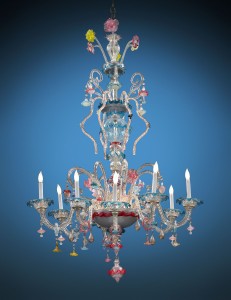Venetian glass captures the dance of light and color unlike any other. Its brilliant hues and dazzling, acrobatic designs mark Venetian glass pieces as some of the most delightful and extraordinary in the world. This ancient art blossomed on the tiny island of glassmakers, whose innovations and creativity would inspire the art of glassmaking throughout the world.
With its origins in Byzantium and Syria, the history of glassmaking in Venice begins 900 years ago. Isolated in her lagoon, the tiny nation was insulated from the rest of Europe during the Dark Ages, and, rarely challenged, was uniquely able to hold on to her riches and flourish. At a time of prosperity, lavish glass pieces became a hallmark of the affluent, a uniquely Venetian testament to wealth. Certainly, no other creative industry could have been more befitting the rich, but small, island nation, as sand and other materials for glassmaking were available in abundance.
Following a devastating fire in Venice in the 13th-century, glass manufacturers were ordered to move outside the city to the nearby Venetian island of Murano. Just over one hundred years later, approximately three thousand glass blowers worked from the island, and the sequestered artisans produced an astonished variety of glass pieces that adorned palaces across Europe. Murano glassmakers continued throughout the Renaissance producing works of astonishing technical and creative mastery, dominating the glass trade until the 18th century.
Napoleon’s conquest of Venice in 1797 decidedly halted the output of Murano glassmakers for about six decades, until the 1850s when it was revived by one determined and enterprising glassmaker and businessman, Antonio Salviati. After Venice regained its independence from foreign rule and prosperity returned to the city, nationalistic artisans began to revitalize the arts that they had lost just a generation before, including the nation’s pride – glassmaking. Salviati, his craftsmen, and his competitors succeeded in restoring the glass industry to its former grandeur by the end of the 19th century.
Murano glassmakers enthusiastically and wholeheartedly rejoined the flourishing art trade throughout Europe, creating pieces that blended traditional Venetian styles with the Art Nouveau design that was sweeping the continent. Glass pieces took on a variety of forms, from delicate vases, cups, and bowls to large elaborate pieces such as blossoming chandeliers and bubbling fountains. Entirely handcrafted, these Venetian glass masterpieces are each a unique, one-of-a-kind testament to the centuries old tradition. Imbued with the romance of times past, these rare works are a delightful and whimsical sight to behold.
The best places to view Venetian glass pieces are the Victoria & Albert Museum in London and Metropolitan Museum of Art in New York, though most pieces remain in private collections and rarely come on the market. M.S. Rau is pleased to have acquired a few exceptional pieces of important Murano glass for our collection, on view at our Royal Street gallery in New Orleans. Or browse our complete selection of antique chandeliers for sale to find the perfect acquisition for your collection.






